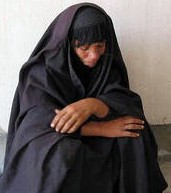Hidden victims of a brutal conflict: Iraq's women
 They came for Dr Khaula al-Tallal in a white Opel car after she took a taxi home to the middle class district of Qadissiya in Iraq's holy city of Najaf. She worked for the medical committee that examined patients to assess them for welfare benefit. Crucially, however, she was a woman in a country where being a female professional increasingly invites a death sentence.
They came for Dr Khaula al-Tallal in a white Opel car after she took a taxi home to the middle class district of Qadissiya in Iraq's holy city of Najaf. She worked for the medical committee that examined patients to assess them for welfare benefit. Crucially, however, she was a woman in a country where being a female professional increasingly invites a death sentence.As al-Tallal, 50, walked towards her house, one of three men in the Opel stepped out and raked her with bullets.
A women's rights campaigner, Umm Salam - a nickname - knows about the three men in the Opel: they tried to kill her on 11 December last year. It was a Sunday, she recalls, and 15 bullets were fired into her own car as she drove home from teaching at an internet cafe. A man in civilian clothes got out of the car and opened fire. Three bullets hit her, one lodging close to her spinal cord. Her 20-year-old son was hit in the chest. Umm Salam saw the gun - a police-issue Glock. She is convinced her would-be assassin works for the state.
The shootings of al-Tallal and Umm Salam are not isolated incidents, even in Najaf - a city almost exclusively Shia and largely insulated from the sectarian violence of the North. Bodies of young women have appeared in its dusty lanes and avenues, places patrolled by packs of dogs where the boundaries bleed into the desert. It is a favourite place for dumping murder victims.
Iraqis do not like to talk about it much, but there is an understanding of what is going on these days. If a young woman is abducted and murdered without a ransom demand, she has been kidnapped to be raped. Even those raped and released are not necessarily safe: the response of some families to finding that a woman has been raped has been to kill her.
Iraq's women are living with a fear that is increasing in line with the numbers dying violently every month. They die for being a member of the wrong sect and for helping their fellow women. They die for doing jobs that the militants have decreed that they cannot do: for working in hospitals and ministries and universities. They are murdered, too, because they are the softest targets for Iraq's criminal gangs.
Iraq's women live in terror of speaking their opinions; of going out to work; or defying the strict new prohibitions on dress and behaviour applied across Iraq by Islamist militants, both Sunni and Shia. They live in fear of their husbands, too, as women's rights have been undermined by the country's postwar constitution that has taken power from the family courts and given it to clerics.
Read the rest at the Observer

<< Home